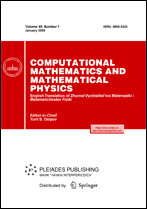|
This article is cited in 1 scientific paper (total in 1 paper)
General numerical methods
Problem of minimizing a sum of differences of weighted convolutions
A. V. Kel'manovab, L. V. Mikhailovaa, P. S. Ruzankinab, S. A. Khamidullina
a Sobolev Institute of Mathematics, Siberian Branch, Russian Academy of Sciences, Novosibirsk, 630090 Russia
b Novosibirsk State University, Novosibirsk, 630090 Russia
Abstract:
A previously unstudied optimization problem concerning the summation of elements of numerical sequences $Y$ and $U$ of respective lengths $N$ and $q\leqslant N$ is considered. The task is to minimize the sum of differences between weighted convolutions of sequences of variable length (of at least $q$). In each difference, the minuend is a nonweighted autoconvolution of the sequence $U$ extended to a variable length (by multiple repeats of its elements) and the subtrahend is a weighted convolution of this extended sequence and a subsequence of $Y$. The variant of the problem with an optimized number of summed differences is analyzed. It is shown that the problem is equivalent to a problem of approximating the sequence $Y$ by an element $X$ of an exponential-size set of sequences. This set consists of all sequences of length $N$ that include, as subsequences, a variable number $M$ of admissible quasi-periodic (fluctuation) repeats of $U$. Each quasi-periodic repeat is generated by admissible transformations of $U$. These transformations are (i) a shift of $U$ by a variable quantity that does not exceed ${{T}_{{\max}}}\leqslant N$ between neighboring repeats, and (ii) a variable extension mapping of $U$ into a sequence of variable length defined in the form of repeats of elements of $U$ with the multiplicity of these repeats being variable. The approximation criterion is the minimum of the sum of squared distances between the elements of the sequences. It is proved that the considered optimization problem, together with the approximation problem, is solvable in polynomial time. More specifically, it is shown that there exists an exact algorithm finding the solution of the problem in $\mathcal{O}(T_{{\max}}^{3}N)$ time. If ${{T}_{{\max}}}$ is a fixed parameter of the problem, then the running time of the algorithm is linear. Examples of numerical simulation are used to illustrate the applicability of the algorithm for solving model application problems of noise-proof processing of ECG-like and PPG-like quasi-periodic signals (electrocardiogram-like and photoplethysmogram-like signals).
Key words:
numerical sequences, difference of weighted convolutions, variable length of convolution, minimum of a sum, polynomial-time solvability, linear-time algorithm, numerical simulation, ECG-like signal, PPG-like signal.
Received: 30.07.2019
Revised: 30.07.2019
Accepted: 04.08.2020
Citation:
A. V. Kel'manov, L. V. Mikhailova, P. S. Ruzankin, S. A. Khamidullin, “Problem of minimizing a sum of differences of weighted convolutions”, Zh. Vychisl. Mat. Mat. Fiz., 60:12 (2020), 2015–2027; Comput. Math. Math. Phys., 60:12 (2020), 1951–1963
Linking options:
https://www.mathnet.ru/eng/zvmmf11169 https://www.mathnet.ru/eng/zvmmf/v60/i12/p2015
|


|





 Contact us:
Contact us: Terms of Use
Terms of Use
 Registration to the website
Registration to the website Logotypes
Logotypes







 Citation in format
Citation in format 
